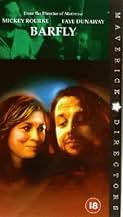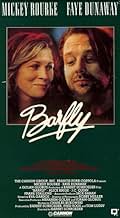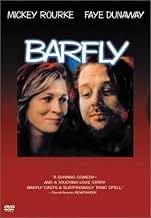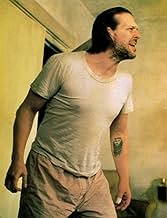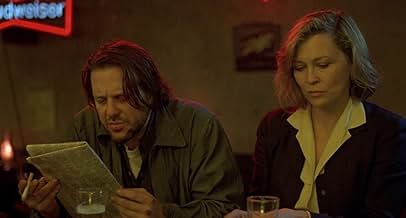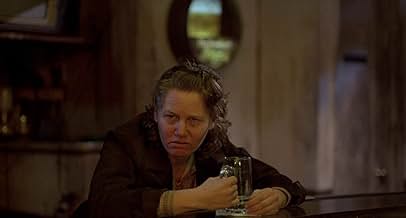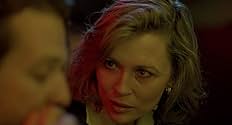VALUTAZIONE IMDb
7,1/10
22.931
LA TUA VALUTAZIONE
La vita del poeta di successo Charles Bukowski e le sue imprese a Hollywood negli anni '60, '70 e '80.La vita del poeta di successo Charles Bukowski e le sue imprese a Hollywood negli anni '60, '70 e '80.La vita del poeta di successo Charles Bukowski e le sue imprese a Hollywood negli anni '60, '70 e '80.
- Regia
- Sceneggiatura
- Star
- Premi
- 6 candidature totali
Gloria LeRoy
- Grandma Moses
- (as Gloria Leroy)
Zeke Manners
- Roger
- (as Zeek Manners)
Recensioni in evidenza
Despite Bukowski's condemnation of Mickey Rourke's portrayal of him/Chinaski in the film (claiming Rourke was too cocky with the role, and didn't stick to the character of Chinaski as Bukowski intended) states Bukowski in the documentary "Bukowski: Born Into This", I still view it as one of the highlights of Rourke's career.
Whether the depiction of a character is exact in the fashion of perfect mimicry is often irrelevant to me in relation to biopics. As a matter of a fact, I often find it the downfall of some biopics, where the physicality may be captured, but the meat and potatoes of the character's are often left by the wayside. Not so in the instance of "Barfly." Rourke nailed Bukowski/Chinaski's crazy, alcoholic, free spiritedness brilliantly, I felt. There was a humor, a tenderness, a coldness, a twisted romanticism, and a bleakness, all wrapped into a greasy, overweight (Rourke pulled a "De Niro", gaining weight and not bathing months before the film's shooting) package you could almost smell from the theater seats.
Faye Dunaway as the aging, sad, beautiful barfly Wanda, gives a performance that yet again reminds us why she is a cinematic legend in her own time! She plays the subtleties and intricacies of Wanda with such aplomb, offering even this - the most pathetic of her roles - a dignity and a sad beauty that not many actresses can pull off.
The casting of this film deserves a round of applause! I've tended bar and worked in the sorts of joints where these all too real people can be found, and I felt as if I was right there again, pouring shots of bourbon, polishing glasses, and making certain that the brawls boiling in the bar get taken to the streets. Frank Stallone's swaggering, bully-of-a-bar tender, macho-man Eddie is hilarious! Gloria LeRoy as "Grandma Moses" the ancient prostitute infamous for her ability to "swallow paste" is priceless. I could go on and on, but I won't! Bukowski's male character counterpart is a macho, beer swilling, bare knuckle fighting, farting kind of man who some may not appreciate, considering that outside of the seedier bars in North America, these types of fellas are a dying breed. With males being force-fed the over-sensitive, turn the other cheek, annoyingly "metro sexual" kinds of roles models and ideals these days, it must be a strange look back over the evolutionary shoulder for some men to see the realities of people like Bukowski! Don't get me wrong - I'm not applauding all of the Chinaski character's behaviors, but I think that some guys could learn a thing or two about themselves from the worst example of the diametric opposite of what they've been told they should be. Sometimes a fight has to be - sometimes it's just plain pathetic, and both examples can be found in Barfly.
Bukowski has always dared to put to page whatever entered his head, and did so with a twisted lovely flourish.
Barbet Schroeder, the man behind such brilliant and critically acclaimed films such as "More" (1969), his work with director as Jean-Luc Godard, his contribution to French "Nouvelle Vague" or New Wave cinema, and his more mainstream flicks such as "Single White Female", places him in a category above many directors working in North America today.
With Barfly, Schroeder captures the gritty realities of lives given over to the excesses of substances and circumstances in a true-to-life way, as he did with his first film "More", a flick about heroin addiction done at a time when the subject was still considered very taboo. The musical score for Barfly supports this film perfectly, too, with the Hammond organ whirling out Booker T. Jones' "Hip Hug Her" as we P.O.V. our way through the film's first scene, past the bar sign, to the bar's door, and into the world of Henry Chinaski. This is all counter-pointed wonderfully by the use of Mozart and Beethoven under Rourke's voice-overs of Chinaski's writing.
To sum it all up - as much as I dig and respect Bukowski, I have to say that even though he wasn't a fan of the flick (long after its release I may add, and he was on set as an adviser and unaccredited cast member - why didn't he say something at the time?), I look at this movie as a wee gem and as a masterpiece daring enough to capture life's underbelly with an acuteness and accuracy many wouldn't dare to put to screen.
~T.Paul
www.t-paul.com
Whether the depiction of a character is exact in the fashion of perfect mimicry is often irrelevant to me in relation to biopics. As a matter of a fact, I often find it the downfall of some biopics, where the physicality may be captured, but the meat and potatoes of the character's are often left by the wayside. Not so in the instance of "Barfly." Rourke nailed Bukowski/Chinaski's crazy, alcoholic, free spiritedness brilliantly, I felt. There was a humor, a tenderness, a coldness, a twisted romanticism, and a bleakness, all wrapped into a greasy, overweight (Rourke pulled a "De Niro", gaining weight and not bathing months before the film's shooting) package you could almost smell from the theater seats.
Faye Dunaway as the aging, sad, beautiful barfly Wanda, gives a performance that yet again reminds us why she is a cinematic legend in her own time! She plays the subtleties and intricacies of Wanda with such aplomb, offering even this - the most pathetic of her roles - a dignity and a sad beauty that not many actresses can pull off.
The casting of this film deserves a round of applause! I've tended bar and worked in the sorts of joints where these all too real people can be found, and I felt as if I was right there again, pouring shots of bourbon, polishing glasses, and making certain that the brawls boiling in the bar get taken to the streets. Frank Stallone's swaggering, bully-of-a-bar tender, macho-man Eddie is hilarious! Gloria LeRoy as "Grandma Moses" the ancient prostitute infamous for her ability to "swallow paste" is priceless. I could go on and on, but I won't! Bukowski's male character counterpart is a macho, beer swilling, bare knuckle fighting, farting kind of man who some may not appreciate, considering that outside of the seedier bars in North America, these types of fellas are a dying breed. With males being force-fed the over-sensitive, turn the other cheek, annoyingly "metro sexual" kinds of roles models and ideals these days, it must be a strange look back over the evolutionary shoulder for some men to see the realities of people like Bukowski! Don't get me wrong - I'm not applauding all of the Chinaski character's behaviors, but I think that some guys could learn a thing or two about themselves from the worst example of the diametric opposite of what they've been told they should be. Sometimes a fight has to be - sometimes it's just plain pathetic, and both examples can be found in Barfly.
Bukowski has always dared to put to page whatever entered his head, and did so with a twisted lovely flourish.
Barbet Schroeder, the man behind such brilliant and critically acclaimed films such as "More" (1969), his work with director as Jean-Luc Godard, his contribution to French "Nouvelle Vague" or New Wave cinema, and his more mainstream flicks such as "Single White Female", places him in a category above many directors working in North America today.
With Barfly, Schroeder captures the gritty realities of lives given over to the excesses of substances and circumstances in a true-to-life way, as he did with his first film "More", a flick about heroin addiction done at a time when the subject was still considered very taboo. The musical score for Barfly supports this film perfectly, too, with the Hammond organ whirling out Booker T. Jones' "Hip Hug Her" as we P.O.V. our way through the film's first scene, past the bar sign, to the bar's door, and into the world of Henry Chinaski. This is all counter-pointed wonderfully by the use of Mozart and Beethoven under Rourke's voice-overs of Chinaski's writing.
To sum it all up - as much as I dig and respect Bukowski, I have to say that even though he wasn't a fan of the flick (long after its release I may add, and he was on set as an adviser and unaccredited cast member - why didn't he say something at the time?), I look at this movie as a wee gem and as a masterpiece daring enough to capture life's underbelly with an acuteness and accuracy many wouldn't dare to put to screen.
~T.Paul
www.t-paul.com
Barfly is a rarity in American cinema: a character study that doesn't worry about telling a story with a beginning, middle, and explosive end. Mickey Rourke is excellent as Henry Chinaski, a writer and habitue of skid row who isn't so much slumming as soaking in it. The real surprise here is Faye Dunaway as his love interest: it's easily her best performance since Chinatown and proves she still has it. Also of note is Frank Stallone as Eddie, the barman who keeps getting into one sided fist fights with Henry. A triumph and one of the best American films of the eighties.
"Barfly" was a fairly successful film when it was released and garnered generally favorable reviews. Roger Ebert gave it four out of four, and along with "Angel Heart," it helped solidify 1987 as the Year of Mickey Rourke.
However, almost twenty years later it isn't talked so much about anymore, and I feel it deserves to be. Rourke gives one of his finest performances as Henry, a loner who walks hunched over like the Hunchback of Notre Dame. Henry works at a bar as a runner - delivering orders and such. But he's always getting into drunken brawls with the bartender, usually losing.
One day Henry's life takes a turn when he meets a downtrodden woman (Faye Dunaway) and they embark on a relationship.
"Barfly" is a great film. Rourke was vocal later on in his career about his dislike of director Barbet Schroeder, but Schroeder's direction is part of what makes this film so good.
However, the absolute best aspect of the movie is Rourke's performance. Embodying the late writer Charles Bukowski (whose work this was based upon, and who had a brief cameo in the film), Rourke is unrecognizable - like Billy Bob Thornton in "Sling Blade," his entire demeanor and physicality seems to change.
I highly recommend "Barfly" - it's funny, dark, witty, touching and downright enjoyable. One of the best films of the '80s.
However, almost twenty years later it isn't talked so much about anymore, and I feel it deserves to be. Rourke gives one of his finest performances as Henry, a loner who walks hunched over like the Hunchback of Notre Dame. Henry works at a bar as a runner - delivering orders and such. But he's always getting into drunken brawls with the bartender, usually losing.
One day Henry's life takes a turn when he meets a downtrodden woman (Faye Dunaway) and they embark on a relationship.
"Barfly" is a great film. Rourke was vocal later on in his career about his dislike of director Barbet Schroeder, but Schroeder's direction is part of what makes this film so good.
However, the absolute best aspect of the movie is Rourke's performance. Embodying the late writer Charles Bukowski (whose work this was based upon, and who had a brief cameo in the film), Rourke is unrecognizable - like Billy Bob Thornton in "Sling Blade," his entire demeanor and physicality seems to change.
I highly recommend "Barfly" - it's funny, dark, witty, touching and downright enjoyable. One of the best films of the '80s.
I came across this movie on HBO one night and like any great movie I was immediately hooked by it. I could tell right away that this movie had a strange artistic appeal to it. The movie is strange, funny, and weird. In one scene Henry (Mickey Rourke) collects 500$ from a rich woman he meets. He then takes it immediately to his flea bag appartment along with a bottle of liquor. He wakes up his girlfriend (Faye Dunnaway)and from out of her slumber they begin to drink. Henry manages to stab a man, get a girlfriend, have a wealthy mistress, be a bar room fighter, and o yeah, a poet. Overall this is a gritty movie about the ups and downs of a poet who insists to live in squalor and would'nt have it any other way.
Perhaps Mickey Rourkes' final great performance, BARFLY sees him as prolific writer/poet Henry Chinaski who rejects conformity in every day society and believes it to be frustratingly fake. As a result, he is a drunk, and prefers to hang out with 'all his friends' in a regular bar by getting into fights whilst the crowd pays the winner (no guesses as to what he spends his money on) until he meets a 'strange girl' at a bar- Wanda (Faye Dunway). The two instantly click- both are intelligent indivuals who reject over regularity in every day passive conversation (Dunaway- 'I hate people, don't you? Rourke- 'I don't mind them, but I seem to feel better when they're not around'). The two form an instant freindship/relationship because of one major primary function that can keep them together- drink. A researcher who picks up talented writers like Henry enters the frame and falls for him due to his prolific writing and offers him a place in 'the good life' with her- but Henry rejects this when she tells him he will 'grow into it' (Rourke- growing is for plants- I hate roots).
BARFLY manages to do something profound that so many films fail to do- in showing us that conformity isn't suited to intelligent, open minded creative individuals like Henry. Rourke excels himself in this role, it's as good a performance but a completely different one from his role in ANGEL HEART (starring in 3 great films, including RUMBLE FISH, really doesn't do him justice- he was the best of his generation in the 80's). He plays Henry not unlike how Jeff Bridges plays Jeffrey 'The Dude' Lebowski in THE BIG LEBOWSKI (I'd be very surprised if the Coens didn't take inspiration from this film, and fans of that particular film should also check this out) as some one who you would consider to be an every day loser but is probably a darn sight more smarter than you believe them to be (as well as having a self serving purpose for the life they have chosen to live). Faye Dunaway, as usual, is uniformly excellent as Henrys lover/drinking partner, managing to convey an aura of sassiness and casual sophistication, and who has also chosen to take this particular path in life for a reason- the same as Henry's. The chemistry between these two leads is astounding, and the script is pitch perfect with dozens of memorable lines (Dunway- 'Whatever happens, don't expect me to fall in love with you', Rourke- 'That's ok, nobody has ever fallen in love with me anyway'). To me at least, Rourke's performance as Henry is the single most likeable character created in any film, and it stays with you long after the film is over. Touching, funny and profound- a minor masterpiece, a 'nice' film, I RECOMMEND IT!
BARFLY manages to do something profound that so many films fail to do- in showing us that conformity isn't suited to intelligent, open minded creative individuals like Henry. Rourke excels himself in this role, it's as good a performance but a completely different one from his role in ANGEL HEART (starring in 3 great films, including RUMBLE FISH, really doesn't do him justice- he was the best of his generation in the 80's). He plays Henry not unlike how Jeff Bridges plays Jeffrey 'The Dude' Lebowski in THE BIG LEBOWSKI (I'd be very surprised if the Coens didn't take inspiration from this film, and fans of that particular film should also check this out) as some one who you would consider to be an every day loser but is probably a darn sight more smarter than you believe them to be (as well as having a self serving purpose for the life they have chosen to live). Faye Dunaway, as usual, is uniformly excellent as Henrys lover/drinking partner, managing to convey an aura of sassiness and casual sophistication, and who has also chosen to take this particular path in life for a reason- the same as Henry's. The chemistry between these two leads is astounding, and the script is pitch perfect with dozens of memorable lines (Dunway- 'Whatever happens, don't expect me to fall in love with you', Rourke- 'That's ok, nobody has ever fallen in love with me anyway'). To me at least, Rourke's performance as Henry is the single most likeable character created in any film, and it stays with you long after the film is over. Touching, funny and profound- a minor masterpiece, a 'nice' film, I RECOMMEND IT!
Lo sapevi?
- QuizThe apartment building where Wanda's apartment was located was an actual building where Charles Bukowski and his lover Jane Baker Cooley, the real-life counterparts to Henry and Wanda, had lived. No one knew this until Bukowski, who was watching the filming, remembered.
- BlooperWhen Henry gets out of bed, Tully has terrible bedhead as their conversation starts. When the view cuts back to her a second later, her hair is neatly brushed.
- Citazioni
Wanda Wilcox: I can't stand people, I hate them.
Henry: Oh yeah?
Wanda Wilcox: Do you hate them?
Henry: No, but I seem to feel better when they're not around.
- Colonne sonoreHip Hug-Her
By Steve Cropper, Booker T. Jones, Al Jackson Jr. and Donald Dunn
Published by Irving Music, Inc. (DMI)
Performed by Booker T. & the M.G.s
Courtesy of Atlantic Recording Corp.
By Arrangement with Warner Special Products
I più visti
Accedi per valutare e creare un elenco di titoli salvati per ottenere consigli personalizzati
- How long is Barfly?Powered by Alexa
Dettagli
- Data di uscita
- Paese di origine
- Lingua
- Celebre anche come
- Barfly
- Luoghi delle riprese
- Bryson Apartments, 2701 Wilshire Blvd., Los Angeles, California, Stati Uniti(Interiors and exterios. As Wanda Wilcox's apartment.)
- Aziende produttrici
- Vedi altri crediti dell’azienda su IMDbPro
Botteghino
- Budget
- 3.000.000 USD (previsto)
- Lordo Stati Uniti e Canada
- 3.221.568 USD
- Fine settimana di apertura Stati Uniti e Canada
- 45.900 USD
- 18 ott 1987
- Lordo in tutto il mondo
- 3.221.774 USD
- Tempo di esecuzione1 ora 40 minuti
- Colore
- Mix di suoni
- Proporzioni
- 1.85 : 1
Contribuisci a questa pagina
Suggerisci una modifica o aggiungi i contenuti mancanti

Divario superiore
What is the Japanese language plot outline for Barfly - Moscone da bar (1987)?
Rispondi

